Greece: New Education Bill Brings a New Students Movement
Thessaloniki, Greece – A new generation of students is rising to fight a proposed education bill and raise their voice against the Greek government for what they call criminal mismanagement of the COVID-19 pandemic.
Universities in Greece have been closed since March 2020. In this period, the Greek Ministry of Education passed an education bill that excludes the lower class strata from entering universities and creates a university police unit.
In response to the education bill, students occupied an administration building at the largest university in all of Greece, Aristotle University of Thessaloniki (AΠΘ), leading to tens of thousands of students and community members participating in the renewed movement. The AΠΘ campus has became the beating heart of this fresh, colorful struggle.
Reflections: A Walk Through AΠΘ (Aristotle University of Thessaloniki)
Passing through the upper gate of the campus in the center of Thessaloniki, Greece’s second largest city, the first thing I notice is the science school. The building has already been occupied for two months and someone has painted with a roller “Down with the law 4777”. About 200 students are holding an assembly sitting on the entrance stairs. They’re having a discussion about continuing their occupation, their actions to reclaim and liven up their campus, and how they will keep on mobilizing against the new education bill dictated by the ministers of education and public order (called “minister of protection of the citizen” in Greece – oh the irony!).
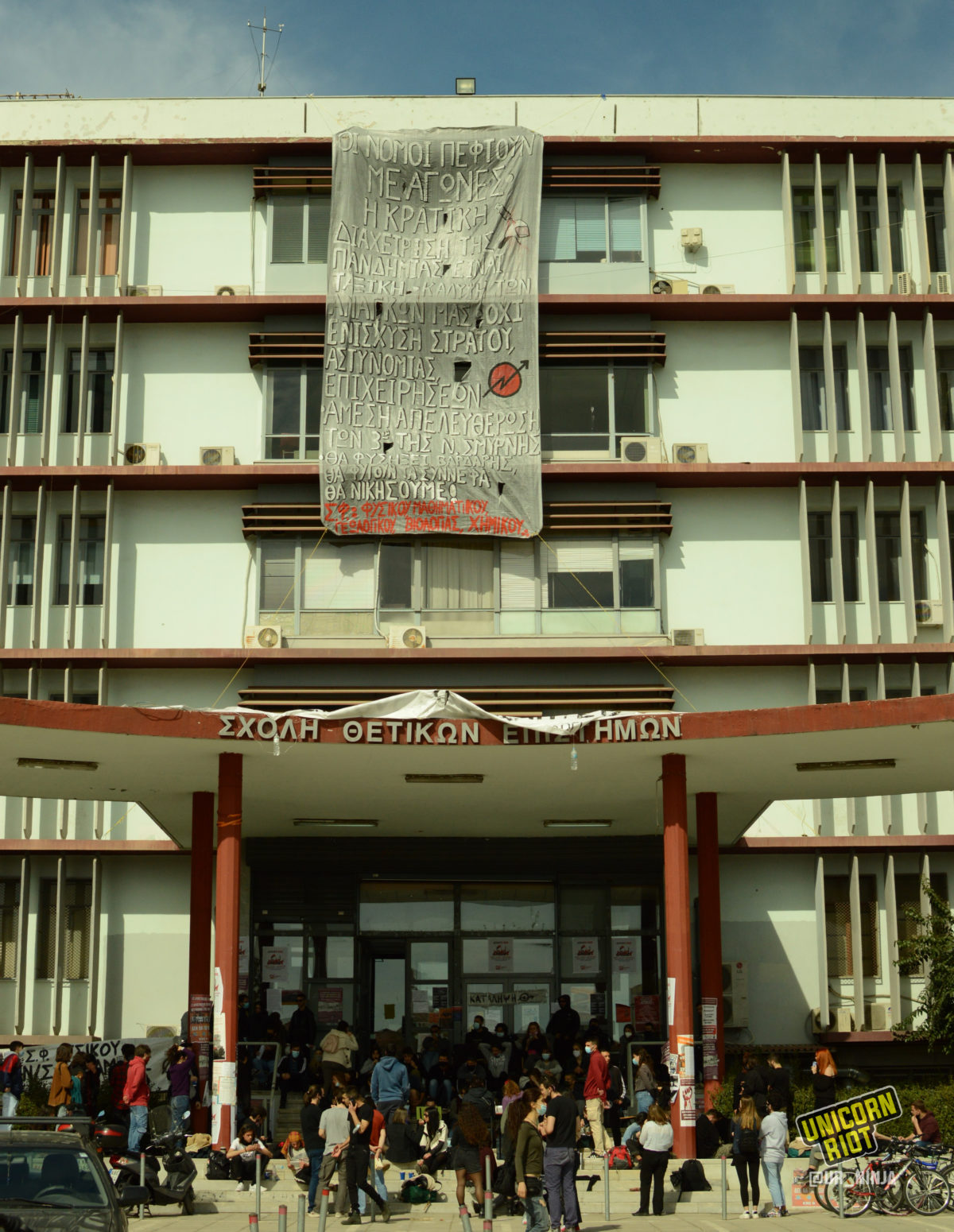
Strolling towards the square in front of the chemistry school, I see it’s full of people, families with children, youth playing soccer, skating or rollerblading, and others dancing or simply hanging out on the grass. On the farthest side of the square another gathering is welcoming the Zapatistas from Mexico visiting on their tour through Europe.
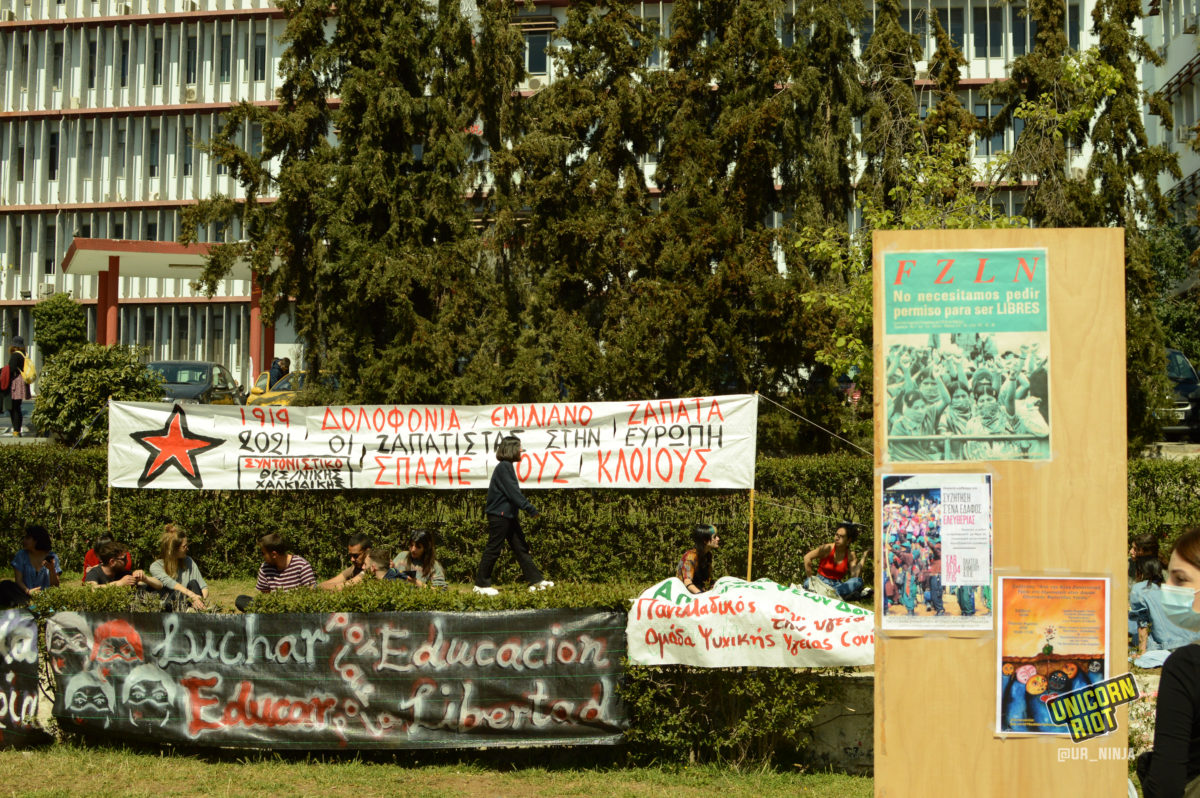
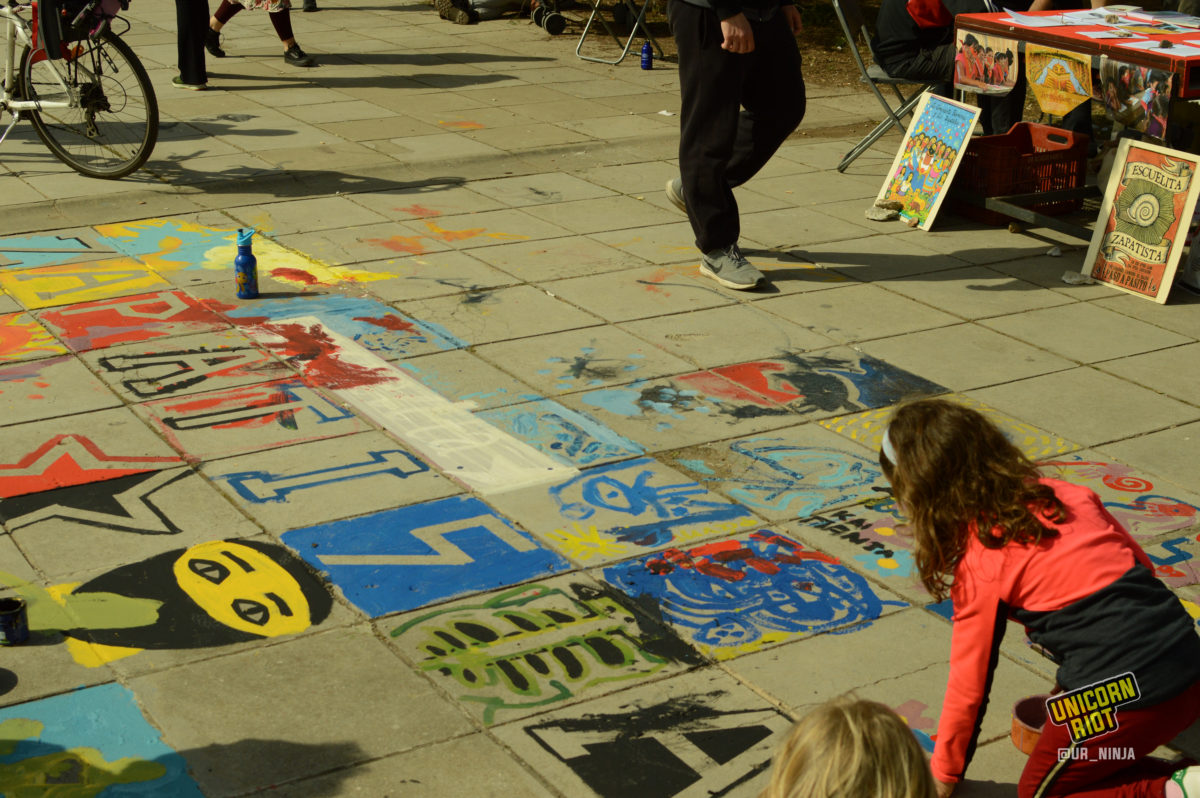
Just around the corner I see tables, stands with books and magazines, workshops, video screenings and a collective kitchen where locals and immigrants are cooking together. I keep on walking towards the philosophy building; the park next to it is also full of young people. The philosophical faculty is under occupation and a huge banner hanging on the facade states:
“Not on the 15th of April not ever, no police in the campus, the law won’t be applied – it will be overturned. Down with the dean of MAT (riot-cops). Papaioanou (the dean) quit. Take measures now to open the schools, everyone in the general assemblies, everyone take to the streets.”
The banner is signed by the student societies of the English, French, historical, archaeological, and philological schools.
In the middle of the park, a so called ‘anti-lecture’ takes place, organized both by student societies and professors, with the public space as its main theme. The anti-lectures are a cooperation of students and some professors in order to reignite knowledge and communication through embodied experience as the universities have been officially closed since March 10, 2020, and all official lessons are given online.
A bit farther, a self-organized antifascist martial arts club is holding an open training. Small gatherings and assemblies are everywhere. Reaching the occupied administration building I come across a drag show. Next to that, some fine arts students are spray painting anti-police graffiti across the wall.
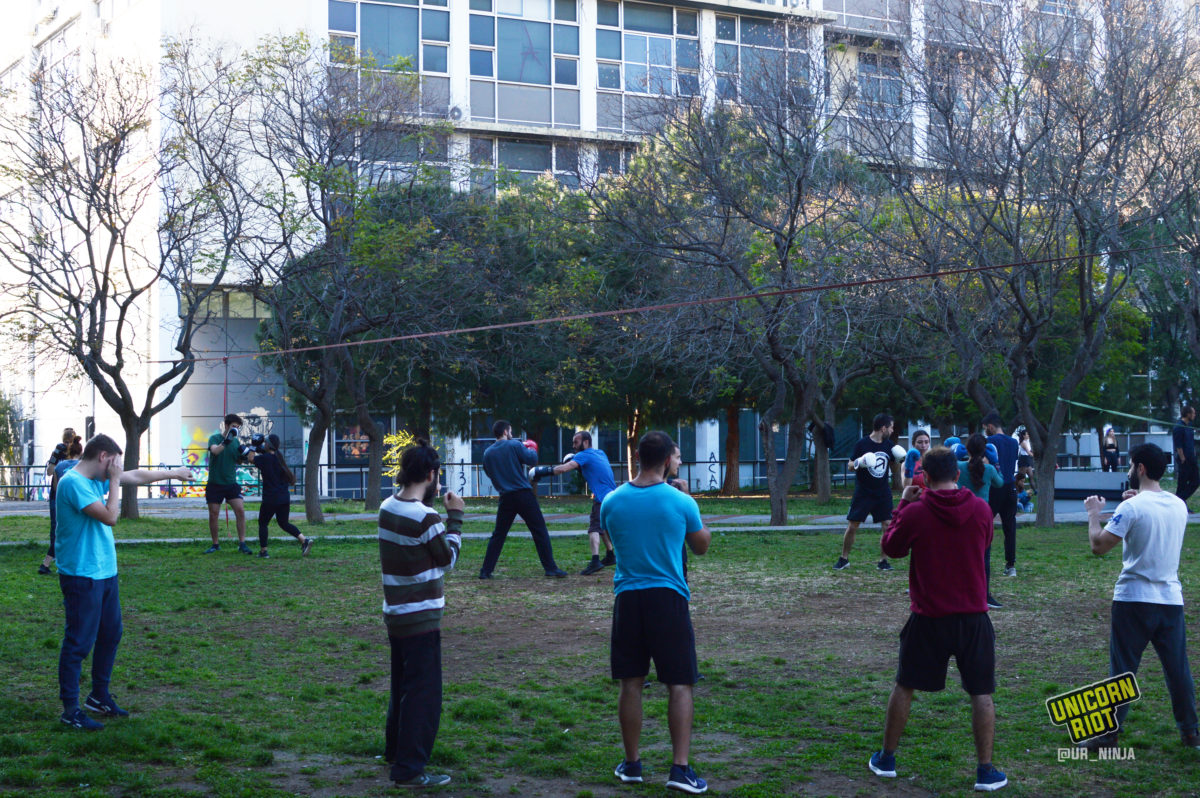
This could be any day at University of Thessaloniki, since its campus is always pulsating with life. The occupations of schools are expanding daily, and a unique universe of culture and resistance is produced by the students procedures and actions: assemblies, events, gigs, workshops, activism and a demo every Thursday in the center of Thessaloniki.
Record scratch, picture freeze – you are probably wondering how we ended up here…
THE TOTALITARIAN FORMATION IN GREECE DURING THE PANDEMIC
The new education bill was only one piece of the latest struggle for people in Greece who are experiencing how the right-wing neoliberal government of the far-right New Democracy party is attempting to transform the country into a police state. Very strict lockdown measures were implemented and the police took over public space while the public health system was abandoned.
Since April 2020, people in Greece have experienced a series of “hygienic measures“ which refer mostly to a militarized and biopolitical management of the COVID-19 crisis. Although prime minister Kyriakos Mitsotakis claims Greece is at war with the coronavirus, the public health system hasn’t been supported or strengthened at all during this period. Healthcare workers have been pushed to their physical and psychological limits this past year.
A Country Quarantined, Coronavirus in Greece Part 1
On the other hand, since the beginning of the pandemic the government’s answer to everything is police, prohibitions and lockdowns. A new joke echoes lately in Greece: “Is there a problem? Ok, then make a new police unit to deal with it.“ According to one of the police chiefs, the police have been reinforced more in the last 18 months than they have been in the last 18 years.
Obligatory SMS messages about daily movements, and curfews after 9 p.m. (after 6 p.m. on the weekends) restrict people’s activities. The ruling right-wing neoliberal government of New Democracy (Nea Dimokratia) has exploited the COVID-19 crisis by shutting down democratic rights and governing by decree. Under the excuse of the pandemic, New Democracy has already scrapped articles of the constitution in order to prevent two large annual demonstrations on November 17 and December 6.
Police deployments everywhere were reminiscent of an occupational army taking over the public space, bullying people and imposing fines of 300 euros. Αll of this has happened under the cover and the blessings of the virologists committee, which consists of scientists appointed by the government to validate its decisions.
This asphyxiating oppressive regime that constantly acts with methods of a state of emergency has left Greece at the bottom of the European list regarding freedoms of the press (24th out of 27). Without this scientific and medical pretext, the ruling government would have much less latitude in its attack on the entire fabric of social and political life.
Since the official beginning of the pandemic, the government has resorted to fast tracking procedures to legislate numerous new bills. Some important examples to understand the range of the state attacks through new legislation during the pandemic are:
- An environmental bill that degrades protected natural areas and sets them free for private exploitation and industrial extraction
- A bill criminalizing and forbidding spontaneous political mobilizations, gatherings, or demonstrations and authorizes police to repress them
- A new labor bill that practically abolishes the 8-hour workday and criminalizes union syndicalism
- A new multi-bill for education (the reason behind the student mobilizations)
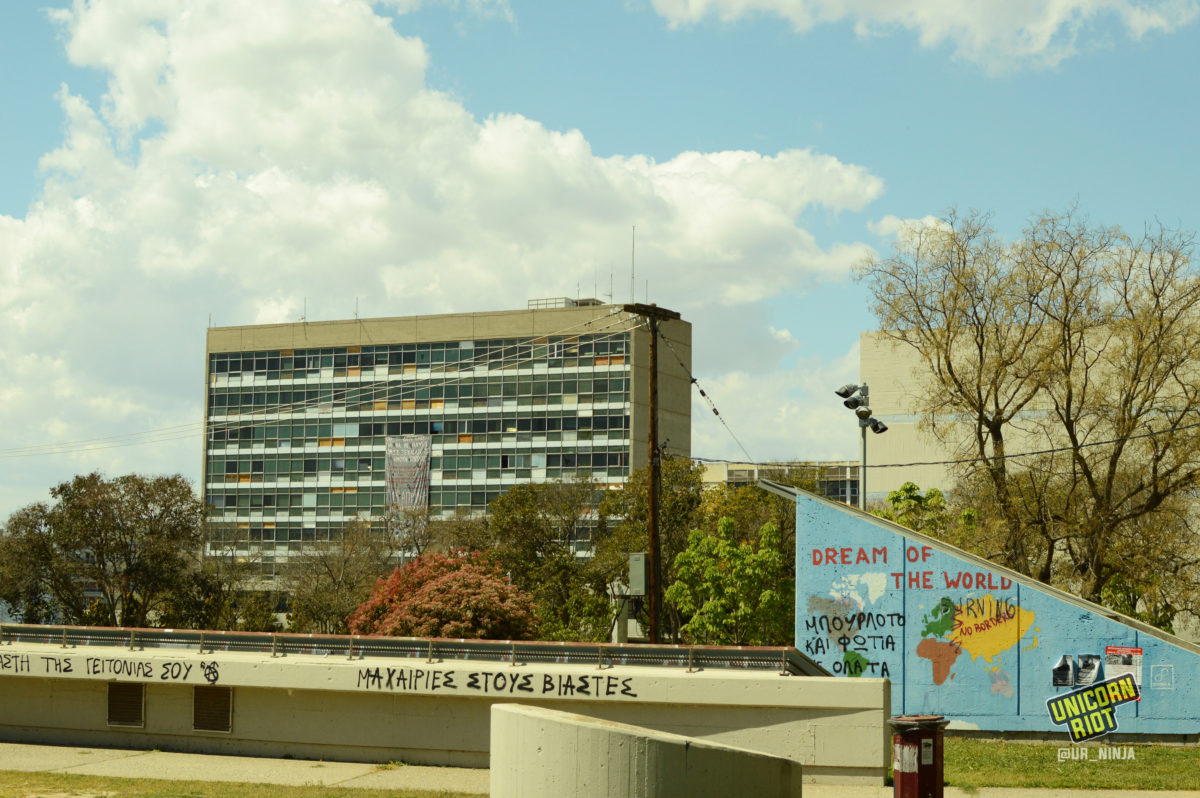
LAW 4777 – THE NEW MULTIBILL FOR EDUCATION
Under the pretext of “ensuring the academic conditions for successful studying and timely completion of the studies”, the Greek government delivers a strong blow to free and public education, maximizing economic class barriers at the same time with Law 4777.
Lets take a closer look on how the educational bill is anticipated to impact Higher Educational Institutions (AEI).
1. The basis grade to successfully enter the university will be increased. This will result to the exclusion of students from lower social strata who don’t have the financial ability to prepare adequately for their entrance to AEI. The passing examinations for AEI are a demanding process that involve extra private lessons (mostly taken at home or in private schools) so that the students can cope with the tests. Additionally, the bill will lead to many new closings of specific schools and departments.
2. The universities will be put into two categories, with intentional catering to “elite schools.” First, the applications for the “elite schools” will take place. These schools will have restricted positions, catering only to elite students. The second phase will impact the departments which will receive much less financial support, if any, and may be among the first that either will be forced to close or function with imposed tuition fees. This comes as a follow up to another evaluation-funding law pushed by Niki Kerameus (Minister of Education) that was approved last January by the New Democracy government.
3. The studying time limit will be decreased. This will significantly impact thousands of students. The poorest parts of society, who are forced to work in order to handle the studying costs, will be excluded from higher education. The application of this limit shapes an antagonistic and intensified studying environment where students are under a constant pressure and won’t have time for other interests, socialization, political action and collective claims.
4. The hiring of 1,500 university police officers who will operate under the control of ELAS (Greek national police) and not the university. Security systems and various techniques of control and surveillance will be upgraded (cameras, entrance cards, etc.) and a new stricter penal code for “offenses” taking place on campuses will be established. The main aim of this section of the bill is to undo asylum from police that students in universities across Greece have had since the U.S.-backed military dictatorship massacred at least 26 students during an occupation of Polytechnic University on November 17, 1973. This bill crushes students’ ability to organize and resist education ‘reforms’ by disallowing assemblies, occupations, and demonstrations. The American embassy in Greece has been pushing for undoing campus asylum and the privatization of universities for over a decade.
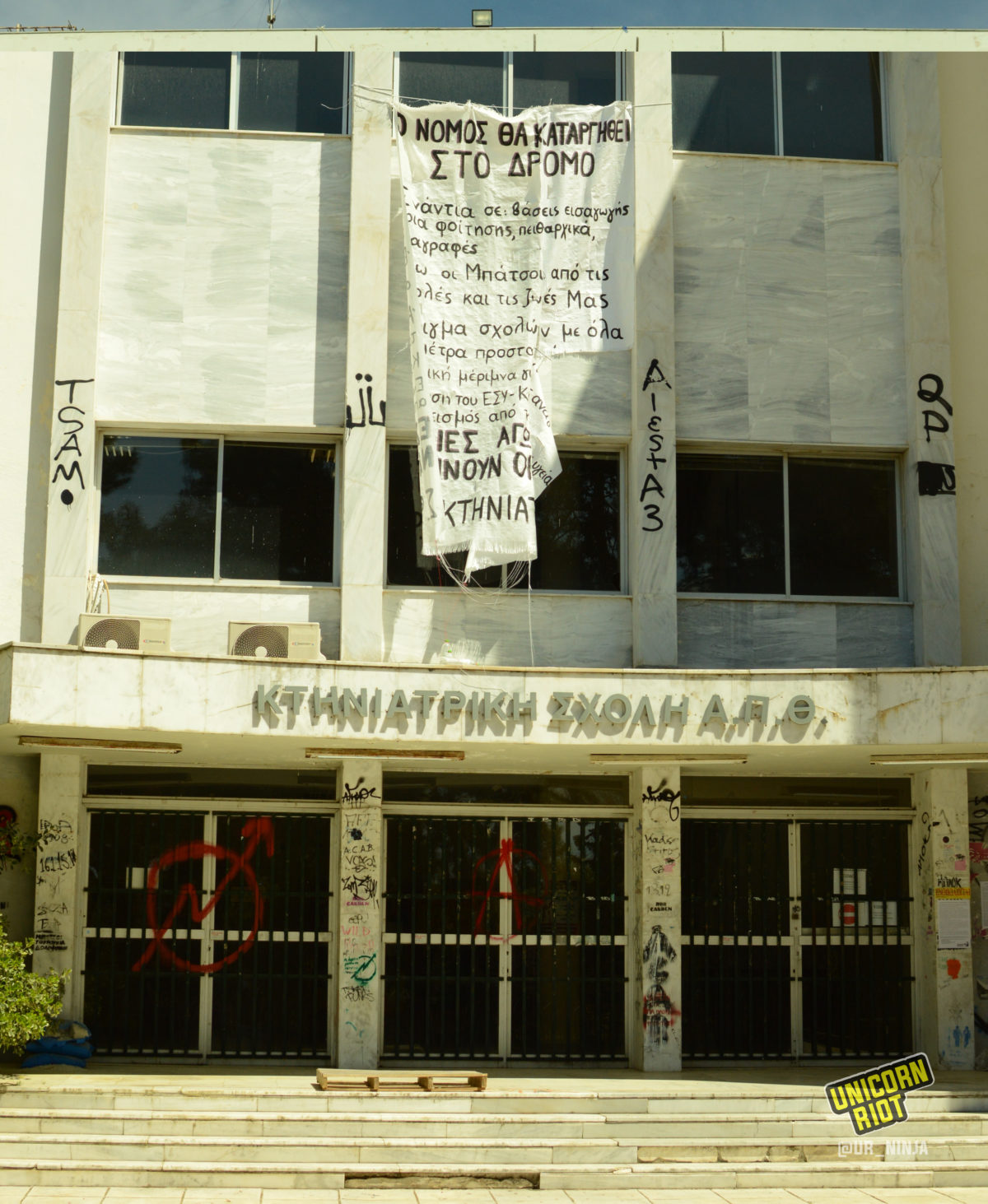
THE EMERGENCE OF A NEW STUDENTS MOVEMENT
Students have been faced with the arduous task of resisting the new bill during a time when state repression was legitimized more than ever in Greek society in the name of the pandemic. The emergence of social movements seemed more difficult than ever, between justified fear of the virus, lockdown measures, and the police reigning unchecked in the public space. People were shuttered into their houses in a permanent state of social numbness.
From March 2020 until January 2021 demos and protests all over Greece were very few with a small amount of people participating. They were met with an excessive state repression and terror with beatings, fines, detentions, arrests, tear gas and water cannons.
The Greek state had succeeded in numbing every protest reaction with a well orchestrated campaign of fear. At the same time, people were suffocating in their houses, having turned their rooms into offices, amphitheaters or classrooms. The less fortunate didn’t have a job or a roof over their head, and were in the street or in jail or a forgotten refugee camp. Resistance hadn’t found its footing yet.
In this scenery, a new generation of militant students arose. The disruption in this constant logic of law and order appeared in Thessaloniki on January 14, when a small number of people gathered in the central “Aristoteles” square and were immediately attacked with batons and teargas by police.
The images of that Thursday established a student demo every Thursday ever since, and put in motion three very dense and explosive months, during which many things changed.
“From the point that progressive movements couldn’t even step on the street to demonstrate to one of the biggest demos ever held in Thessaloniki on March 11 with over 10,000 people. Every Thursday now gives us the sweet certainty that thousands will be in the streets protesting.
From the empty, closed universities and students trapped behind a screen, to campuses full of people. From the baton beatings and the stifled attempts to fight back, the police were forced to be totally absent in the demos.
From the stressful quick running to our house at a quarter to nine as if someone was hunting to shoot us, we started to enjoy the squares until late not caring exactly about the curfew, reclaiming the public space and clashing with the police.
From the dystopia of anti-constitutional bans of gatherings in important political anniversaries such us the Polytechnic Uprising (17th November) or the 6th of December, we moved to organizing two and three demos on various topics every week. And not even once did we think to ask permission for it.“
– Anonymous University Student
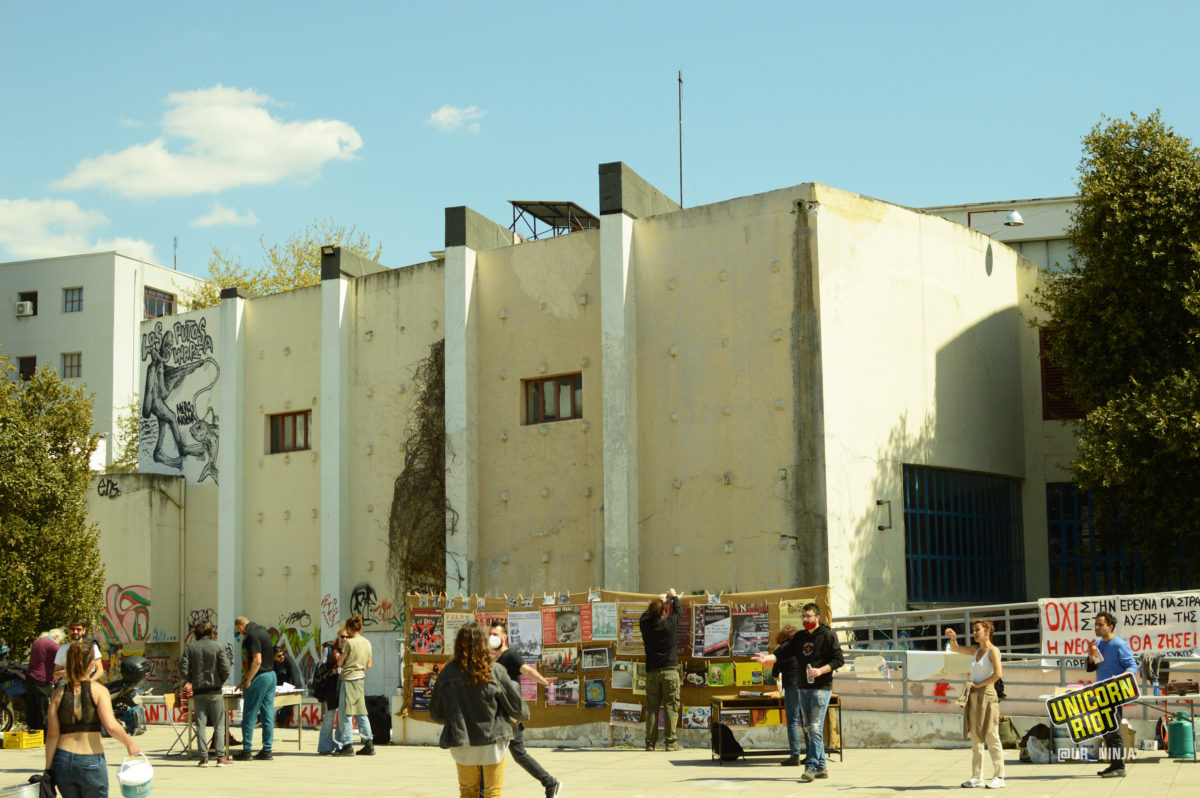
A SMALL CHRONICLE OF RESISTANCE
February 8, 2021 – The Occupation
A trademark moment in the students mobilization was on February 8 when the students occupied the administration building at AΠΘ (Aristotle University of Thessaloniki). The squatted building was turned into the center of the struggle, the first gathering and fermentation point of the new student resistance.
February 22, 2021 – The Eviction Attempt
On February 22, the police executed its first eviction attempt of the occupied administration building at AΠΘ. Students and press were subjected to extreme repression by a militarized police force that entered the university and beat and arrested people. One of the first signs that the students’ movement was getting massive was the solidarity march to the court buildings the following day, where thousands participated. The occupation itself remained, continued, and grew despite the violent interference of the police. All the while, more occupations and initiatives were emerging asymmetrically throughout the campus.
March 7, 2021 – The Anti-Police Factor
On Sunday, March 7, Nea Smyrni, a young man in a working class neighborhood of Athens, was brutally beaten without reason by police forces in the middle of a square full of people. The video of his beating went viral on social media and outrage erupted throughout Greece, creating an unexpected anti-police movement with the youth on the front lines. The timing was explosive as one of the largest demos in Thessaloniki history was about to happen.
March 11, 2021 – The Eviction
Although the students had previously announced an end time to their occupation of the administration building being 11 a.m. on March 11, authorities carried out a 6 a.m. raid on the building. Around 30 police with faces covered entered the admin building at AΠΘ and arrested everyone inside. For the next few days, the situation in the campus could be summarized as: NO STUDENTS ALLOWED IN THE UNIVERSITY. At every entrance there were police not letting any student to pass inside the campus and executing strict identity checks on university workers, giving everybody a taste of what allowing police back on Greece’s university campuses would be, like if and when that happens.
On the same day, one of the biggest protests in the city’s history took place in the streets of Thessaloniki, when 10,000 people took to the streets. Participants in the demonstration said they could feel the climate was changing, fear was evaporating and a sense of rage against the police was building in the air. That day a whole generation took to the streets and shouted for everything – health, education, freedom.
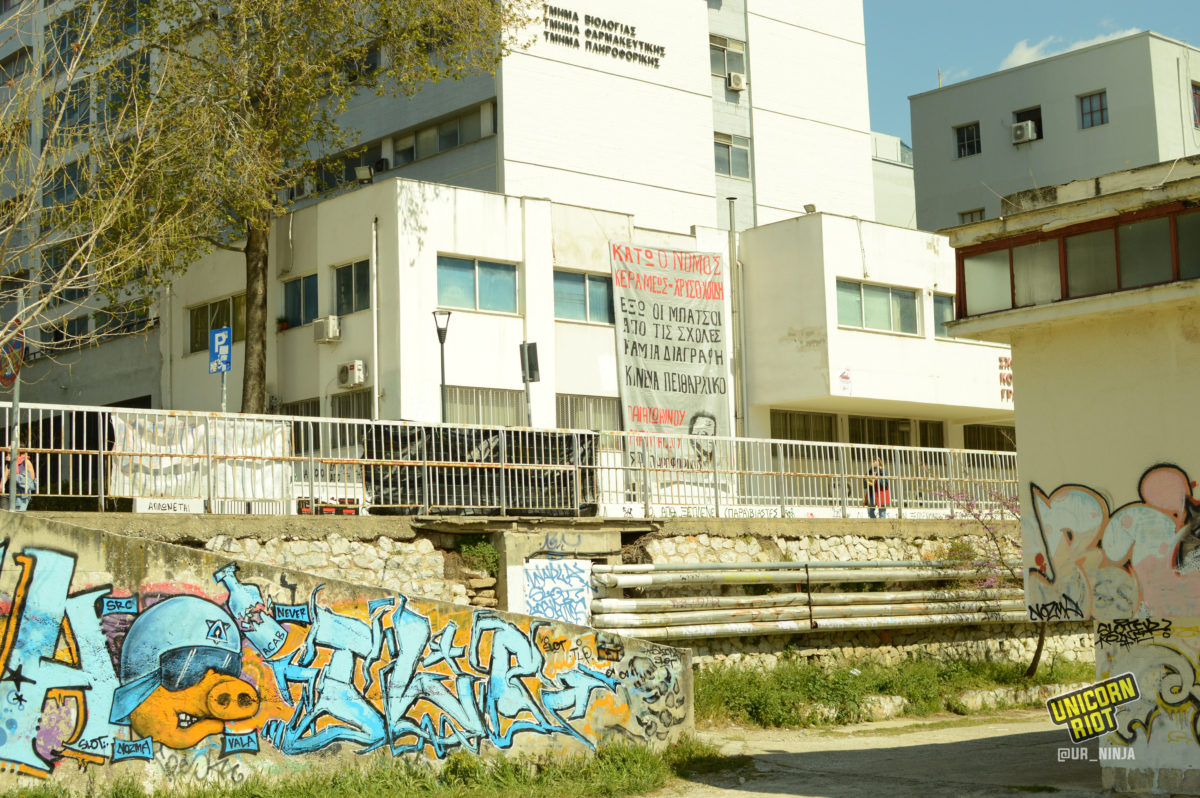
POLICE DELAYED, LIFE’S GOOD – THE FUTURE IS NOW
The protests against police violence all over Greece, and the government’s fear of a potential social explosion, put a temporary pause on the state repression. Less police checks were seen in the street, less fines imposed, a more discreet police presence was seen at protests and state forces withdrew from the public space which was then left open to reclaim.
Young people grabbed the opportunity of the police absence and filled the parks and squares with life. In this spirit and after the eviction of March 11, students decided to open up their struggle by inviting all the citizens of Τhessaloniki to reclaim the campus as a free social space. The sociopolitical mood of the moment helped direct this with a rapid pace and soon it was the epicenter for many to express themselves, protest, meet each other, fall in love, and live what had been deprived from them after a year of hard pandemic lockdown. Almost two months later, the university is still alive and every day something different and unique is being born inside it.
Managing to force the state to postpone its plans for a university police force until after the summer and slow down on pushing LAW 4777, the students’ movement achieved its first practical victory. The rest of the bill remains active but the students have shown their determination to fight until the government takes back the whole bill and are preparing for a potentially interesting autumn.
There is an important connection with other struggles throughout the students’ mobilizations – healthcare workers and their demands for free public health; the hunger strike of the political prisoner Dimitris Koufontinas for his legal right to get transferred to the jail in Athens; the feminist demos on March 8, in a country which is suffering from the rape culture and femicides; the refugee crisis in a country that, along with the EU, has legitimized refugee pushbacks, leading to hundreds of deaths in the Mediterranean; and workers’ rights in a country where the New Democracy government is set to abolish the 8-hour workday and criminalize labor syndicalism.
The most visible tendency in this students movement is the antiauthoritarianism, with students creating a breach from traditional models of political organizing in the universities, away from a revolutionary vanguard and bureaucracy, moving towards an ungoverned liberation struggle.
The last strong student movement of 2006-7 was the starting point for a long series of struggles. Yet, it doesn’t make sense to prophecize about the new wave of social movements after the dead period that followed the left wing SYRIZA party’s rise to political power in 2015. What is definite in these moments, though, is that the future isn’t canceled. While we can’t know what it will be, many in this new movement are imagining new possibilities.
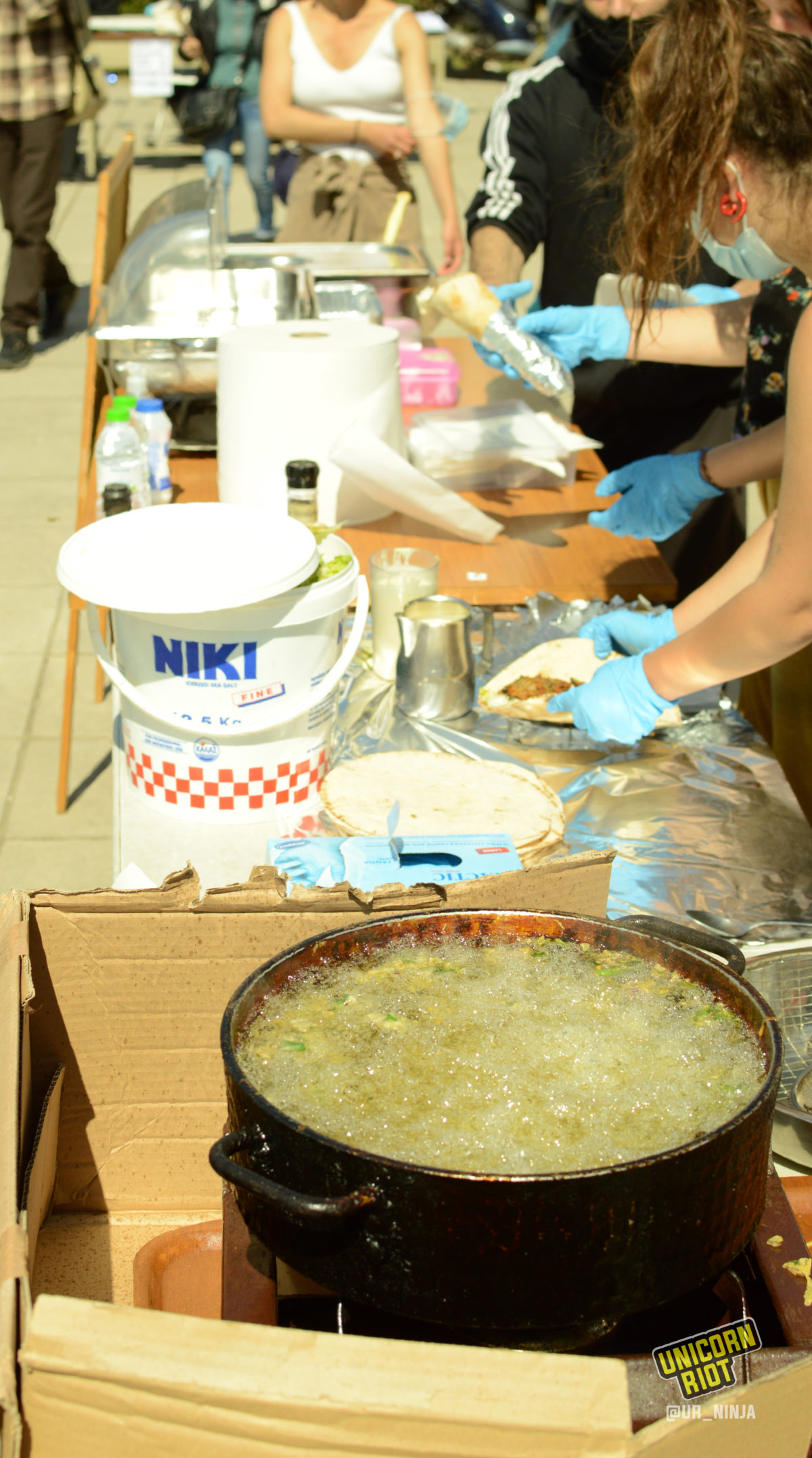
All images, including cover image, contributed by Yegor Halva.
Follow us on X (aka Twitter), Facebook, YouTube, Vimeo, Instagram, Mastodon, Threads, BlueSky and Patreon.
Unicorn Riot's Specials From Greece [2018-2021]:
- Greece: New Education Bill Brings a New Students Movement - May 29, 2021
- Greek Police Occupy and Desecrate Memorial Site of Teen They Killed - December 8, 2020
- Historic Squats, Rosa Nera and Terra Incognita, Raided by Greek Police - September 9, 2020
- Shots Fired at Squatted Social Center in Exarcheia, Athens - August 30, 2020
- Mutual Aid to Detained Refugee Women Grows — Coronavirus in Greece Part 3 - May 7, 2020
- Worker-Occupied Factory Sends Soap to Refugee Camp – Coronavirus in Greece, Part 2 - April 28, 2020
- A Country Quarantined, Coronavirus in Greece Part 1 - April 25, 2020
- Greek Government Cuts Power to Worker-Run Factory in Midst of Pandemic - March 30, 2020
- Passing the Point of No Return: Interview with Rouvikonas Anarchist Collective - December 24, 2019
- Attacks on Capitalist Targets on the Rise as Greek Police Increase Violence - December 23, 2019
- Government Deadline of Greek Squat Evictions Draws Near - December 4, 2019
- Greek Police Raid Squats and Evacuate 269 Refugees, Community Symbolically Reoccupies Spirou Trikoupi 17 - September 21, 2019
- 143 Refugees Arrested as Greek Police Begin Exarcheia Raids - August 27, 2019
- OmniaTV, Grassroots Independent Media in Greece - August 14, 2019
- Life-Sentence Overturned for Greek Police Officer that Killed Teenager - July 30, 2019
- Occupy, Resist, Produce: Inside the Self-Managed Factory of Vio.Me. - Apr 16, 2019
- Workers Healthcare Center of Vio.Me., Created by the Workers for the Community - Apr 16, 2019
- Greece: Political Prisoners Pt. 3 – Criminalized by Association - Feb 7, 2019
- Major Clashes Mark 10 Years Since Greek Police Killing of 15 Year Old Alexis - Dec 9, 2018
- Athens Prepares for 10th Anniversary of Teenager’s Death by Police - Dec 6, 2018
- Heraklion’s Autonomous Open Market Generates Solidarity Economy - Nov 23, 2018
- Occupied Urban Gardens Grow Community, Stunt French Gentrification - Nov 21, 2018
- Greek Police Attack Anarchists After Demo for Victims of 1973 Student Uprising - Nov 18, 2018
- Reports From Greece – 13 Part Series – 2017
Please consider a tax-deductible donation to help sustain our horizontally-organized, non-profit media organization:

Unicorn Riot's Special Reports From Greece [2017]:
- Greece: Alternatives to Neoliberal Capitalism – Introduction
- Greece: Action of Solidarity With Squats and Against Evictions
- Greece: Anarchists Defend Exarcheia’s Autonomous Zone From Police
- Greece: ADYE, Exarcheia’s Free Self-Organized Healthcare Clinic
- Greece: Political Prisoners Pt. 1 – Tasos Freed & Irianna Jailed (Τάσος & Ηριάννα)
- Greece: Political Prisoners Pt. 2 – Targeting of Anarchists & Autonomous Groups
- Greece: Networks of Resistance Pt. 1 – ZAD, Bure, Hambach Forest
- Greece: Networks of Resistance Pt. 2 – Infrastructure; ExarcheiaNet & Cooperativa Integral
- Greece: Alternative Economies & Community Currencies Pt. 1 - Athens Integral Cooperative
- Greece: Alternative Economies & Community Currencies Pt. 2 - Kenya’s Sarafu-Credit
- Greece: Alternative Economies & Community Currencies Pt. 3 - FairCoop
- Greece: The House of Women for Empowerment and Emancipation
- Greece’s First Housing Squat for Refugees & Migrants, Notara 26


